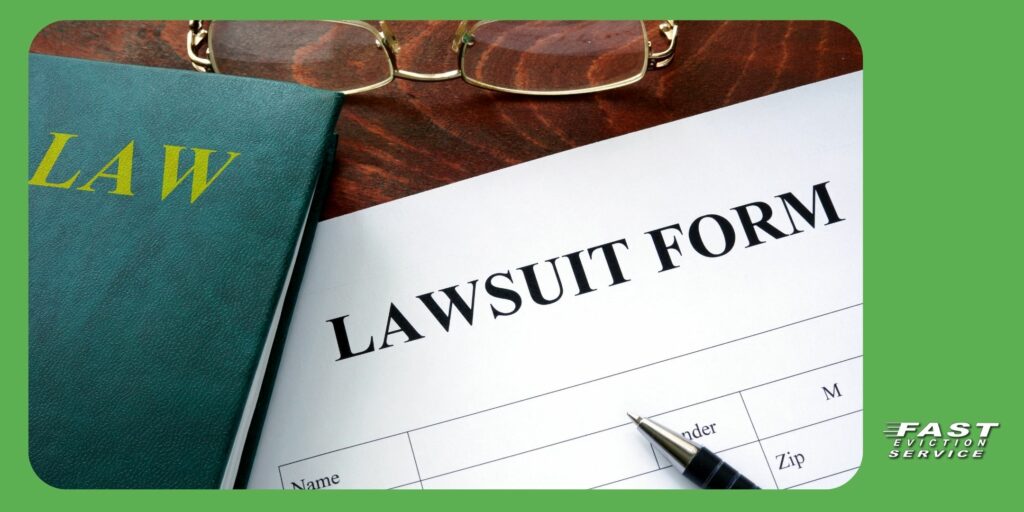Updated 07/12/24
Becoming a landlord is a great way to make extra income or plan ahead for your retirement. There are a lot of perks but there are also liabilities to keep in mind. Landlords can become a target for tenant lawsuits. Which is why it’s a great idea to learn how to protect landlords from tenant lawsuits.
It’s important to look into areas of your business with possible vulnerabilities and take the measures necessary to avoid getting sued. Landlords not only have to ensure they practice fair and legal business practices. They must go above and beyond to avoid tenant lawsuits.

How to Protect Landlords from Tenant Lawsuits
Let’s look into some areas where landlords commonly overlook.
Day to Day business practices
The first thing you should do is look into your day to day business procedures. Whether it’s you or hired help attending tenants and applicants, it’s important to:
Don’t use discriminatory verbiage
It’s easy for landlords or property managers to make mistakes on their rental ads. When looking for a single person to rent their studio apartment to, it’s easy to place “Singles Only” in their ad. This could be considered discriminatory to a married couple.
Another example is offering discounts on rental application fees to a married couple whereas a single applicant would pay full price. You shouldn’t do it. This could be considered discrmination.
Always use a lease or rental agreement
This should be a basic business practice to protect a landlord from a tenant lawsuit. Make sure you include all of your important clauses and California required disclosures. If you don’t have a lease, evicting and protecting yourself from a tenant lawsuit becomes tricky.
How you communicate with your tenants
Nowadays it might seem easy to shoot a text to your tenant about something. Maybe they were late on their rent. Maybe you’ve gotten used to having your tenant text you for issues. It’s better business practice to either have it in writing or an email that can leave behind a paper trail.
A great way to protect landlords from tenant lawsuits is having enough evidence to defend yourself in court. The more proof you have of communication between you and your tenant, the better your chances.
Enforce your lease
Don’t be too lenient as tenants will quickly take advantage of you. Every violation should be recorded with a properly served notice to your tenant and pictures if possible. If you have a no pet policy and learn of a tenant babysitting a pet for a few days, make sure you serve them a notice to cure or quit. Even if you’re ok with the babysitting. Leave a paper trail if you want to properly avoid tenant lawsuits.
Tenant’s and applicant’s privacy
Protecting your tenant’s and applicant’s privacy is more crucial now than ever. This applies to their personal data you collect during the screening process and when they become your tenant. Apply good security practices when storing and managing their personal information.
The Federal Fair Credit Reporting Act has strict compliance rules on how landlords are allowed to use the information obtained from such reports. It’s important that you and your personnel read and keep this information in mind.
During their tenancy, ensure you avoid spying on your tenants. Don’t pry into their personal space/life. Just because you are the landlord, it doesn’t give you the right to encroach on their privacy. If you are going to enter the rental property, ensure you give proper notice and respect their schedules.
Have adequate insurance
There are many landlord insurance providers. Do your research and ensure your policy covers AT LEAST
- Liability in case a tenant, yourself or a contractor/vendor gets injured on your property.
- Property damages.
- Lawsuits brought on to you by your tenant.
Learn about “umbrella” insurance policies that go above and beyond just covering the basics. These types of policies can extend landlord’s liability by covering at least $1 million in coverages.
You or your property managers or grounds crew are bound to make a mistake while running your business. Making a mistake during your first eviction action, illegally entering your tenant’s property or someone injures their foot due to a poorly maintained sidewalk. These are all very possible scenarios and you want adequate landlord’s insurance to have your back and to avoid a tenant lawsuit.
Constantly maintain your property
Ensure you have an easy way your tenants can contact you for maintenance/repair requests. There are plenty of online platforms now that can handle your entire property management experience. From creating and listing ads, screening your applicant, to handling maintenance requests ticket systems.
You should make all maintenance requests top priority to avoid possible uninhabitability issues and tenant lawsuits.
Remember that this also includes common areas such as garbage bins, benches, pools, laundry and more. Remove any debris that can become environmental hazards such as garbage buildups. This could attract rodents, roaches and disease.
Safety measures for your property
Learning how to protect yourself from tenant lawsuits includes learning how to protect your tenants. Ensure your property is well lit at night and install security cameras in areas with very low and high volume traffic. Pay special attention to property access points and parking areas. This could help deter crime on your property.
You should also provide constant maintenance to your common areas such as sidewalks, benches, grass areas, etc. Cutting your grass on a weekly basis will avoid rodent and bug issues.
Discrimination training
You and your staff should constantly hold training sessions on updated discrimination guidelines from Fair Housing and HUD to avoid discrimination law suits.
You and your staff should familiarize yourselves with The Fair Housing Act which prohibits landlords and property managers from rejecting applicants based on the applicant’s race, religion, gender, national origin, disabilities or familial status. Stay away from asking any type of question regarding these factors.
Is your property accessible to all applicants? Disabled applicants/tenants must have equal opportunities to rent your rental property and landlords should make necessary accommodations to ensure this is possible.
Disclosures on your rental agreement
In California, you are required by law to disclose certain elements about your rental property in your rental agreement. Here are a few examples of what is required to scare off potential tenant lawsuits:
- Lead based paint
- Pest control treatments (which pesticides have been used and when.)
- The usage of asbestos
- If any carcinogenic materials were used during construction/remodels.
- Death in rental units (there are limitations)
Prospective tenants should have all of the appropriate information to decide whether or not they would want to live in your rental property. Not disclosing as much information about potential hazards on your property can lead to a landlord getting sued by a tenant.
You should never self evict
Evictions can become complicated and very frustrating. One mistake, however, such as shutting off utilities in retaliation can land you in very hot water. You should let experts guide you and follow all the legal rules.
Follow security deposit guidelines
Whether you plan on utilizing the security deposit in its entirety, make deductions or return it whole, there are procedures a landlord must follow such as providing the tenant with receipts, disposition letters, etc within 20 days of the date they moved out.
One of the most common landlord/tenant disputes is still the disposition of the security deposit. Tenants think landlords overuse it and landlords think they don’t use enough of it. To help avoid legal issues, you should implement move in and move out checklists to have proof of what the condition of the rental was when the tenant moved in and what it’s like when they move out.
Many experts believe that the best way to protect landlords from tenant lawsuits is by being a good landlord. Sounds easy enough but I honestly believe there’s a bit more to it than that. Are all tenants good tenants? We hope this article at least gives you a few ideas of some areas to look into so you can take proactive measures to tighten up possible legal vulnerabilities.





